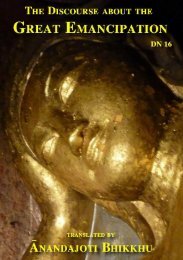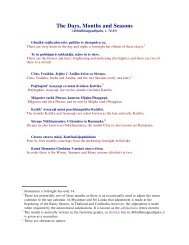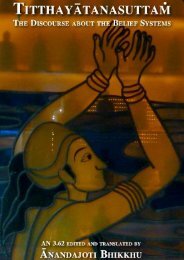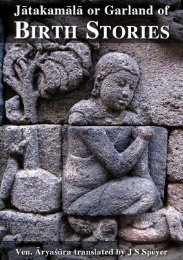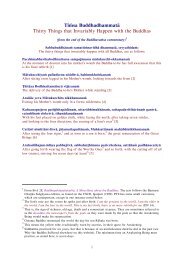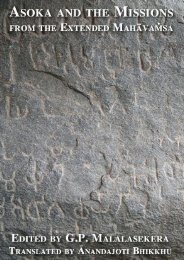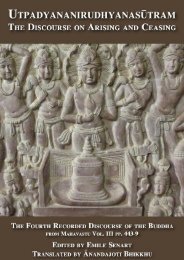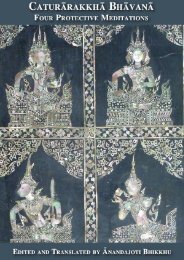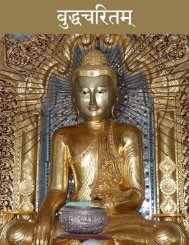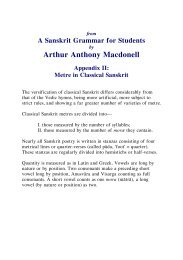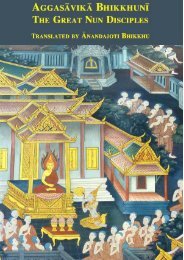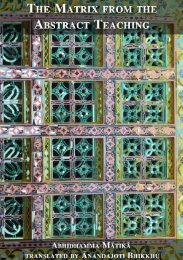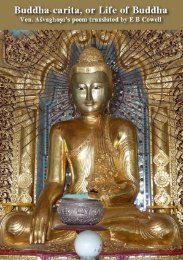MahÄkhandhako The Great Chapter - Ancient Buddhist Texts
MahÄkhandhako The Great Chapter - Ancient Buddhist Texts
MahÄkhandhako The Great Chapter - Ancient Buddhist Texts
You also want an ePaper? Increase the reach of your titles
YUMPU automatically turns print PDFs into web optimized ePapers that Google loves.
<strong>The</strong> <strong>Great</strong> <strong>Chapter</strong> - 178<br />
Gambhīre ñāṇavisayĕ anuttare upadhisaṅkhayĕ vimutte<br />
After (they had) attained deep knowledge in the realm of unsurpassed liberation<br />
with the destruction of attachments 216<br />
Anuppatte Veḷuvanaṁ atha nĕ Satthā byākāsi:<br />
<strong>The</strong> Teacher then spoke about them in the Bamboo Wood, (saying):<br />
“Ete dve sahāyā āyanti, Kolitŏ Upatisso ca,<br />
“<strong>The</strong>se two companions who are coming, Kolita and Upatissa<br />
Etaṁ mĕ Sāvakayugaṁ bhavissati Aggaṁ bhaddayugan.” ti<br />
Will be my pair of Chief Disciples, an auspicious pair.”<br />
Atha kho Sāriputta-Moggallānā yena Bhagavā tenupasaṅkamiṁsu,<br />
<strong>The</strong>n Sāriputta and Moggallāna approached the Gracious One,<br />
upasaṅkamitvā Bhagavato pādesu sirasā nipatitvā,<br />
and after approaching and falling with their heads at the feet of the Gracious One,<br />
Bhagavantaṁ etad-avocuṁ:<br />
they said this to the Gracious One:<br />
“Labheyyāma mayaṁ Bhante Bhagavato santike pabbajjaṁ,<br />
“May we receive the going-forth, venerable Sir, in the presence of the Gracious One,<br />
labheyyāma upasampadan.”-ti<br />
may we receive the full ordination.”<br />
“Etha bhikkhavo” ti Bhagavā avoca “svākkhāto Dhammo,<br />
“Come, monks,” said the Gracious One, “the Dhamma has been well-proclaimed,<br />
caratha brahmacariyaṁ sammā dukkhassa antakiriyāyā.” ti<br />
live the spiritual life for the complete ending of suffering.” 217<br />
Sā va tesaṁ āyasmantānaṁ upasampadā ahosi.<br />
That was these venerable ones’ full ordination. 218<br />
216 This phrase is a locative absolutive, not as extraordinary as Rhys-Davids makes out.<br />
217 Comm: Mahāmoggallānatthero sattahi divasehi Arahatte patiṭṭhito, Sāriputtatthero<br />
aḍḍhamāsena; the Elder Mahāmoggallāna was established in Worthiness within seven days,<br />
the Elder Sāriputta within half a month.<br />
218 <strong>The</strong> commentary explains that at the time of the Buddha Anomadassī there were two<br />
ascetics named Sarada and Sirīvaḍḍha who, seeing that Buddha’s Chief Disciples, aspired to<br />
be Chief Disciples themselves, and later were reborn and became Sāriputta and<br />
Mahāmoggallāna respectively.



